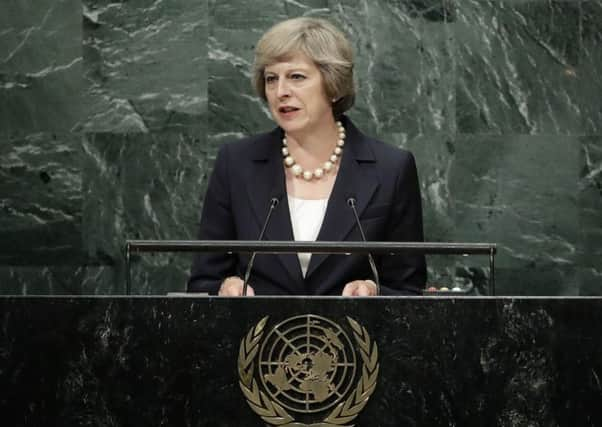Theresa May: UK will remain a global player post-Brexit


Mrs May said the UK would complete the process of ratifying the Paris agreement by the end of the year.
The Prime Minister told the gathering of world leaders in New York that the UK remained a “confident, strong and dependable partner internationally”.
Advertisement
Hide AdAdvertisement
Hide AdShe said: “We will continue to play our part in the international effort against climate change.
“And in a demonstration of our commitment to the agreement reached in Paris, the UK will start its domestic procedures to enable ratification of the Paris agreement, and complete these before the end of the year.”
The command paper leading to the ratification will be laid in Parliament after it returns from the conference recess next month. Mrs May also said that, when Britons backed Brexit, “they did not vote to turn inwards or walk away from any of our partners in the world”.
She said: “Faced with challenges like migration, a desire for greater control of their country, and a mounting sense that globalisation is leaving working people behind, they demanded a politics that is more in touch with their concerns - and bold action to address them.”
Mrs May stressed that the UK would seek to hit the target of spending 0.7 per cent of gross national income on overseas aid. Britain will also strive to fulfil the Nato commitment to spend two per cent of GDP on defence, she said.
The UN general assembly has been dominated by the migration crisis and Mrs May has set out the principles guiding her approach, including that refugees should claim asylum in the first safe country they reach and that nations have a right to protect their borders.
She also called for a better distinction between genuine refugees and economic migrants.
She said: “By ensuring a managed and controlled international migration response - and at the same time investing to tackle the underlying drivers of displacement and migration at source - we can reject isolationism and xenophobia, achieving better outcomes for all of our citizens - and particularly for the most vulnerable.” Mrs May said the world’s leaders must acknowledge the concerns felt around the world about the pace of globalisation.